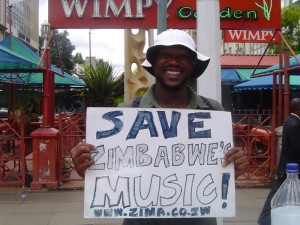Only serious democrats must have celebrated the parliamentary boycott by more than half of MDC-T legislators on Tuesday 2 March 2010, against their leader’s call for the lifting of sanctions. For one, this incident is pregnant with meaning for our fumbling democracy and besides, the honourable members have a right to react in the manner they see fit.
This understanding could have been marred by the ZBC News reporter who had gone there to cover the story, but decided to give the nation his opinions instead, about the members of parliament involved in the fray. The language used against the legislators was harsh and to the effect that they were useless and did not deserve to be members of parliament.
It is clear this incident has ruffled a lot of feathers. Very few people will realize that it might not have been Prime Minister Tsvangirai’s wish to call for the lifting of sanctions, at least not for now. Even his speech suggests that it is a case of somebody holding a gun onto his head.
Certainly everything proves the matter is not top priority on MDC-T’s agenda. Nobody knows for sure that much has been done in breaking down the old order. There is still a lot of intimidation, and suspicion. What ZANU PF will have to realize though, is that while MDC-T leader Morgan Tsvangirai has played his role, even against such stern rebuke from his subordinates in the Global Political Agreement, it is the ZANU PF party now that will have to do most of the enormous work by providing sufficient, authentic evidence that all the suspicions are false and reports of acts of a criminal nature are without a basis, with guarantees that indeed there is no return to the party’s known terrorist ways.
And above all ZANU PF will have to convince their counterparts in government that they are doing something that deserves MDC-T support in calling for the urgent lifting of sanctions. It is ZANU PF that will have to mollify the aggrieved scores of MDC-T legislators whose memories are still fresh and thus are not ready to see things the ZANU PF way.
And to the honourable members of parliament who were brave enough to walk-out, you have made democracy work for the country. It is important to emphasize the vital point that there are thousands of Zimbabweans out there, who do not feel, like you do, that ZANU PF is tame enough to allow for the removal of the sanctions and for the holding of a free and fair democratic election. A lot more has to be done in stemming the levels of human rights abuse, still prevalent in our society including giving Zimbabweans a truly democratic environment.
What we need not lose sight of is the fact that those whom we are calling upon to remove the so called sanctions were given compelling, graphic evidence that was used in the crafting of the legislation that put in place the said embargo.
The Government of National Unity will have to come up with an equally compelling dossier of facts that proves beyond any reasonable doubt that Zimbabweans are actively involved in the full implementation of the terms of the Global Political Agreement without a fear or favour.
But still, the situation has put a lot of pressure on ZANU PF, to prove to the international community that the party will never sink to the same stinking levels that it sank to in the years leading to the 2008 harmonized elections. ZANU PF will have to undergo a serious public sanitization exercise to rid itself of the stink that has associated with its image, if it is serious about courting the support of the electorate in the next election. For who, in his right frame of mind, would vote for a party that beats up its citizens, maims them, or even kills them for harboring views different to its own.
Unfortunately ZANU PF is not capable of change. The party and its leadership will not apologize to Zimbabweans for what it has put them through since it assumed power at independence, in 1980. It will not apologize to the people of Matebeleland and indeed the entire country for the horrors of the Gukurahundi genocide, not even for the untold human suffering caused by the destruction of people’s homes in the crazy state sponsored Murambatsvina program, or that of the economy or even the orgy of violence millions of Zimbabweans were subjected to in the run up to the 2008 disputed election.
Zimbabweans do not know that these people are sorry, or that they wont let these things happen again. A lot of people are still reportedly being harassed for making public their opinions. Public space is still being used exclusively for ZANU PF propaganda. Corruption and the politics of patronage is still the order of the day. The public is not convinced it is the sanctions that are solely to blame or that we should be crying about. ZANU PF will have to account for the collective administrative incompetence that led to the collapse of the once jewel of Southern Africa. And the party’s elite will have to explain their apparent affluence against the state’s bankruptcy. Somebody must be guilty!
No, we do not know that the Government of National Unity has done enough, in implementing the terms of the Global Political Agreement. As such, we cannot all be seen to be calling for the removal of targeted sanctions whose real impact on the masses remains public speculation.



 A week ago
A week ago 





